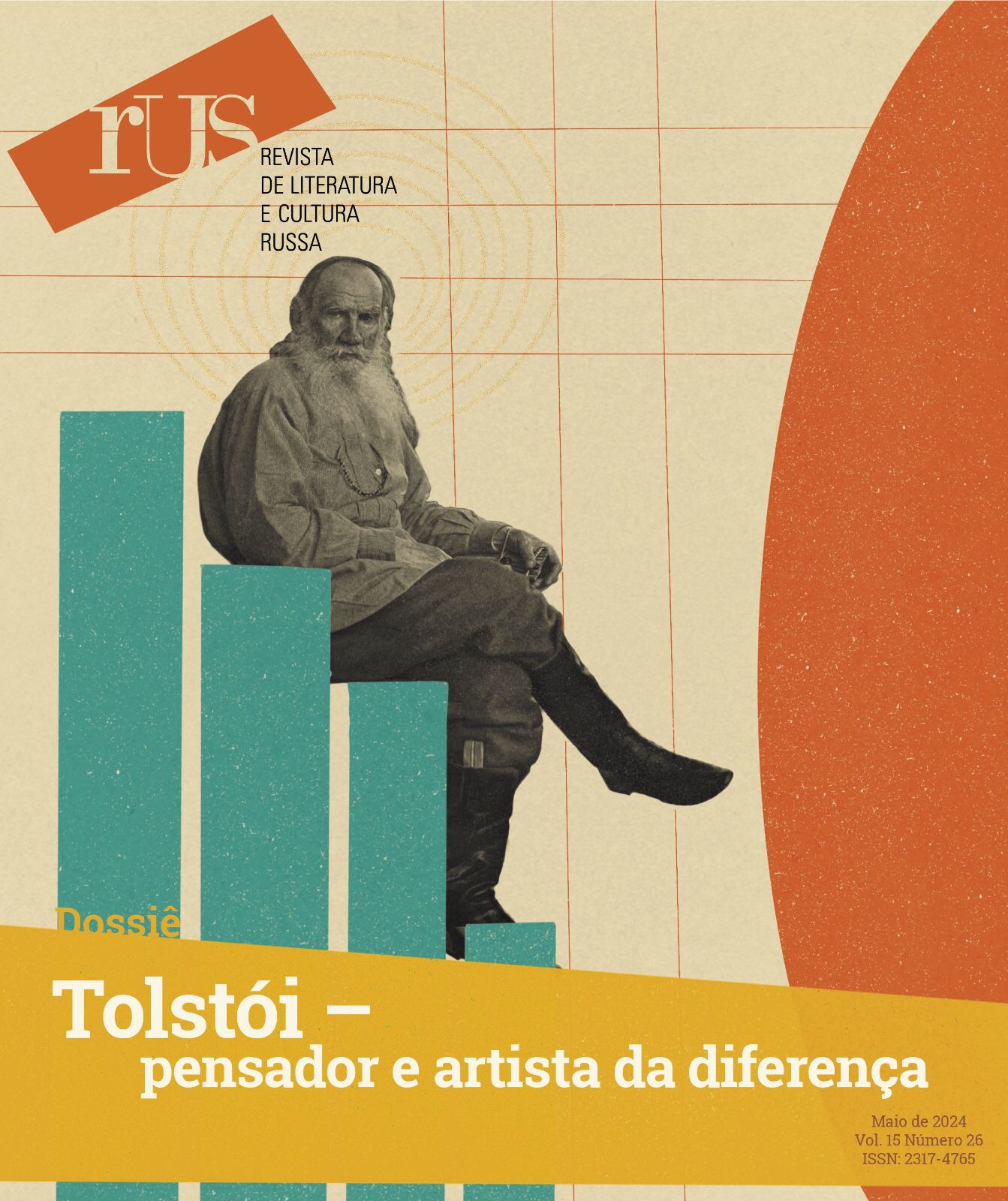On Living and on Dying: Hadji Murat, or the Poem of Force
DOI:
https://doi.org/10.11606/issn.2317-4765.rus.2024.224418Keywords:
Tolstoy, Hadji Murat, Violence, Simone WeilAbstract
This article focuses on Hadji Murat (1912), Tolstoy's posthumous novel, in which the author revisits the topus of the Caucasus and recreates the last months of the life of the legendary hero of the resistance. Our reading of this singular work, and of the successive revisions it went through until it reached its definitive form, takes as its starting point Simone Weil's reflection on the Iliad as a "poem of force".
Downloads
References
BLOOM, Harold. “Tolstoy and Heroism”. In: The Western Canon. New York: Riverhead Books, 1995.
BAYLEY, John. Tolstoy and the Novel. London: Chatto & Windus, 1966.
CALLARD, Agnes. The Fear of Death and Whether Philosophy helps you with it. Lisboa: Brotéria, 13 dezembro 2021 [https://www.youtube.com/watch?v=NHi777d0jAc&t=2595s]
HERMAN, David. “Khadzhi-Murat’s Silence”. In: Slavic Review, vol. 64, n. 1, 2005.
MALCOLM, Norman. Ludwig Wittgenstein, A Memoir. Oxford: Clarendon Press, 2001.
PLATÃO, Fédon. Intro., trad. e notas Maria Teresa Schiappa de Azevedo. Coimbra: Minerva, 1998.
TOLSTOI, Lev. “Произведения” (Obras). In: Полное собрание сочинений (Obras Completas Reunidas), Том 35. Москва: Государственное издательство, 1950.
TOLSTOI, Lev. “Дневники и Записные книжки” (Diário e Cadernos de anotações). In : Полное собрание сочинений (Obras Completas Reunidas), Том 53. Москва: Государственное издательство, 1953.
TOLSTOI, Lev. “Três Mortes”. In: O Diabo e Outros Contos. Trad. e notas Nina Guerra e Filipe Guerra. Lisboa: Relógio d’Água Editores, 2008.
TOLSTOI, Lev. Hadji Murat, Trad. e notas Nina Guerra e Filipe Guerra. Lisboa: Relógio d’Água Editores 2009.
TOLSTOI, Lev. Cossacos, Novela do Cáucaso. Trad. e notas Nina Guerra e Filipe Guerra. Lisboa: Relógio d’Água, 2010.
TOLSTOI, Lev. Ressurreição. Trad. Nina Guerra e Filipe Guerra. Lisboa: Editorial Presença, 2010.
TOLSTOI, Lev. O que é a arte?. Trad. Ekaterina Kucheruk, Lisboa: Gradiva, 2017.
WEIL, Simone. L’Iliade ou le poème de la force. Pref. Claude Le Manchec. Paris : Éditions de l’éclat, 2014.
Downloads
Published
Issue
Section
License
Copyright (c) 2024 Ana Matoso

This work is licensed under a Creative Commons Attribution-NonCommercial-ShareAlike 4.0 International License.
Authors who publish in RUS agree to the following terms:
a. Authors retain copyright and grant the journal right of first publication with the work simultaneously licensed under a Creative Commons Attribution 4.0 International License (CC BY-NC-SA 4.0) that allows others to share the work with an acknowledgement of the work’s authorship and initial publication in this journal.
b. Authors are able to enter into separate, additional contractual arrangements for the non-exclusive distribution of the journal’s published version of the work (e.g., post it to an institutional repository or publish it in a book), with an acknowledgement of its initial publication in this journal.
c. Authors are permitted and encouraged to post their work online (e.g., in institutional repositories or on their website) prior to and during the submission process, as it can lead to productive exchanges, as well as earlier and greater citation of published work (See The Effect of Open Access).





